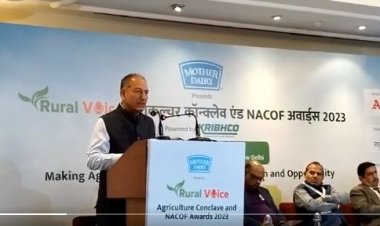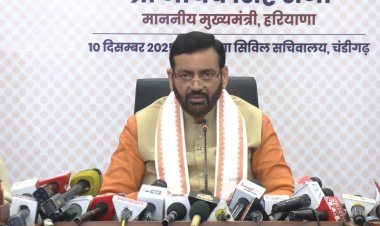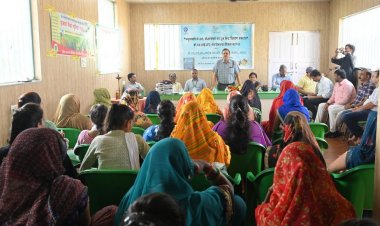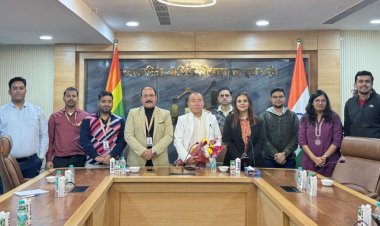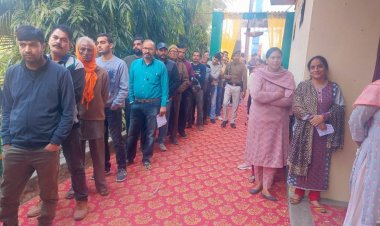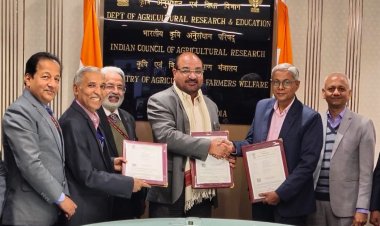Genetics expert Prof. KC Bansal speaks on implications of approval to GM mustard
The Genetic Engineering Appraisal Committee (GEAC) has approved the environmental release of GM mustard DMH-11 recently. While the approval has been supported by some, it has been criticized by others. In order to get detailed information about GM mustard, Rural Voice Editor-in-Chief Harvir Singh spoke to leading geneticist Prof. KC Bansal, Secretary, National Academy of Agricultural Sciences (NAAS).
The Genetic Engineering Appraisal Committee (GEAC) has approved the environmental release of GM mustard DMH-11 recently. This Indian variety has been developed as a cross between two varieties: the Eastern European variety Early Heera-2 and the Indian variety Varuna. Claims are being made that its yield is about 30 per cent more than that of common mustard. While its approval has been supported by some, it has been criticized by others.
In order to get detailed information about GM mustard, Rural Voice Editor-in-Chief Harvir Singh spoke to leading geneticist Prof. KC Bansal, Secretary, National Academy of Agricultural Sciences (NAAS). You may watch this show of Rural Voice Dialogue by clicking on the video link given above. Below are given a few excerpts from the interview.
Speaking on the approval of environmental release to GM mustard, Prof. Bansal said that the GM mustard issue had been pending for the last 20 years. The trials approved by the government are in the farmers’ interest. Prof. Bansal said that approval had been given to the environmental release of transgenic mustard hybrid DMH-11 and the parental lines consisting of barnase, barstar and bar genes to develop new hybrids under the supervision of the Indian Council of Agricultural Research (ICAR). These may now be used to develop hybrid varieties of crops.
GM technology need of the hour
DMH-11 has been developed by the team of Prof. Deepak Pental from the University of Delhi, said Prof. Bansal. He said that GM technology was the need of the hour to bridge the gap between crop yields. The global productivity of mustard is double that in our country. Prof. Bansal said that while the global productivity of mustard is 20-25 quintals per hectare, the productivity of mustard in India stands at 13 quintals per hectare. If GM mustard is allowed to be cultivated, we can increase productivity in our country. Prof. Bansal said, “We import edible oils worth more than Rs 1 lakh crore every year to meet the edible-oil needs of our country. We can minimize this (edible-oil) deficit by increasing the productivity of mustard.”
DMH-11 mustard technology
Prof. Bansal said that a hybrid seed was developed by crossing two different plant varieties. The yield of the first generation of the hybrid variety obtained by such crossing is expected to be greater in comparison to that of the source varieties. But it is not easy to develop a mustard hybrid. This is because mustard is a self-pollinating crop. Its flowers have both male and female organs. In the flowers of self-pollinating plants, male and female parts both exist in the same flower.
The Centre for Genetic Manipulation of Crop Plants at the Delhi University has developed a system in which three genes — barnase, barstar and bar — have been used. Prof. Bansal said that Barnase-Barstar is a successful GM technology to develop a hybrid variety of mustard. The hybrid plant developed through this technique has 30 per cent greater yield.
Use of GM technology in other countries
Prof. Bansal said that GM mustard DMH-11 had been tested at various locations and in various climates by the Indian Council of Agricultural Research (ICAR)–Directorate of Rapeseed-Mustard Research. He said that DMH-11 had given 30 per cent more yield per hectare than Varuna mustard. It was through this technology that a hybrid canola seed had been developed in Canada 25 years ago, he said. Currently, canola is cultivated from GM seeds in 90 per cent of the area there. This technology is also being used in the US and Australia.
GM mustard seeds to be available to farmers in two years
Prof. Bansal said that trials might be conducted at 100 places from the seeds available at present. If everything goes as planned, GM mustard seeds will be available to farmers in two years. Prof. Bansal said that GM mustard did not pose any risks to the bees. Trials have been conducted for this in Punjab and Pusa. GM mustard has also been tested in Canada and found to be fully safe.



 Join the RuralVoice whatsapp group
Join the RuralVoice whatsapp group

















